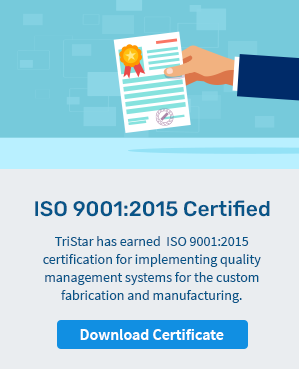2 min read
ASTM Standards in Bearing Selection: Why are they Important?
![]() Adrian Carrera
January 2, 2026
Adrian Carrera
January 2, 2026

Have you downloaded your free copy of the Bearing Selection Design White Paper? If so, you’re probably familiar with ASTM Testing Standards for plastic materials. What’s less obvious is how these standards directly influence bearing performance, reliability, and design confidence.
At TriStar Plastics, ASTM standards are a foundational part of how we help engineers select, validate, and design plastic and composite bearing solutions. In this article, we explain why ASTM standards matter, how they’re used in bearing selection, and how TriStar applies them in real-world engineering decisions.
What Is ASTM and Why Engineers Rely on It
ASTM (formerly American Society for Testing and Materials) is a globally recognized organization that develops standardized test methods for materials, components, and systems.
For plastic and composite bearings, ASTM standards:
- Define how material properties are measured
- Ensure test repeatability and comparability
- Provide a common technical language between designers, suppliers, and OEMs
Without ASTM standards, comparing bearing materials across suppliers would be unreliable and inconsistent.
How ASTM Standards Are Used in Bearing Engineering
ASTM standards specify how to test physical, mechanical, thermal, electrical, and tribological properties of plastics and composites.
These standards allow engineers to:
- Compare materials objectively (apples-to-apples
- Predict how bearings will perform under load, heat, and motion
- Validate material suitability for regulated or safety-critical applications
- Reduce design risk before prototyping or production
At TriStar, ASTM data is not marketing information, it’s engineering input used during material selection and component design.
Why ASTM Standards Are Critical to Bearing Selection
ASTM acts as a quality-control clearinghouse for polymer materials used in industrial components.
When a bearing material complies with ASTM standards:
- Raw material quality is verified and repeatable
- Performance claims are test-backed, not assumed
- Engineers can design with confidence instead of overengineering “just in case”
This is especially important in industries like automotive, aerospace, food processing, and medical equipment, where bearing failure can have serious safety, compliance, or downtime consequences.
ASTM Standards and Bearing Selection in Practice
ASTM standards simplify bearing selection by creating clear, measurable material benchmarks.
For example, in automotive and heavy equipment design, ASTM test data supports:
● Load and compressive strength requirements
● Heat deflection limits under continuous operation
● Impact and fatigue resistance in oscillating joints
● Dimensional stability under moisture or chemical exposure
This gives OEMs confidence that specified materials will perform consistently across production runs and suppliers.
Expert Note from TriStar: ASTM standards are essential, but they’re only the starting point. Our engineers interpret ASTM data in the context of real applications; load direction, motion type, duty cycle, shaft finish, and environment. That’s how we move from “material compliance” to “application success.”
Common ASTM Standard Test Methods for classifying plastic bearings
Below are key ASTM standards* TriStar engineers routinely reference when evaluating plastic and composite bearings:
- D149 - Dielectric Strength
- D150 - Dielectric Constant and Dissipation Factor of Plastics
- D256 - Izod Impact
- D638 - Tensile Properties of Plastics
- D648 - Heat Deflection Temperature
- D695 - Compressive Properties of Rigid Plastics
- D570 - Water Absorption of Plastics
- D7774 - Flexural Fatigue Properties of Plastics
- D790 - Flexural Properties of Unreinforced and Reinforced Plastics and Electrical Insulating Materials
- D792 - Specific Density & Gravity
- D953 - Bearing Strength of Plastics
- D1822 - Tensile Impact
- D2990 - Tensile, Compressive and Flexural Creep and Creep-Rupture of Plastics
- D3418 - Melting Point
- D3702 - Coefficient of Friction
- D7107 - Creep Measurement of Self-lubricating Bushings*
*ASTM International astm.org
Why ASTM Data Alone Isn’t Enough
ASTM tests are standardized—but real applications aren’t.
A material may perform well in a single ASTM test but fail prematurely if:
- Load direction is misunderstood
- PV limits are exceeded
- Thermal expansion isn’t accounted for
- Shaft hardness or surface finish is incorrect
This is where engineering assistance matters. TriStar uses ASTM data alongside:
- Application-specific PV calculations
- Wear and tribology data
- Field experience across industries
- Custom bearing geometry recommendationsxxx
ASTM Standards + Engineering Support = Better Bearings
ASTM standards give engineers confidence in material properties. TriStar’s engineering team turns that data into reliable, application-ready bearing solutions.
Whether you’re designing:
- A self-lubricating replacement for bronze
- A composite bearing for heavy equipment
- A plastic bearing for regulated or clean environments
ASTM-backed material selection combined with engineering insight reduces risk, cost, and downtime.
Ready to explore ASTM standards for your next bearing selection? Ask a TriStar Expert for a recommendation!










